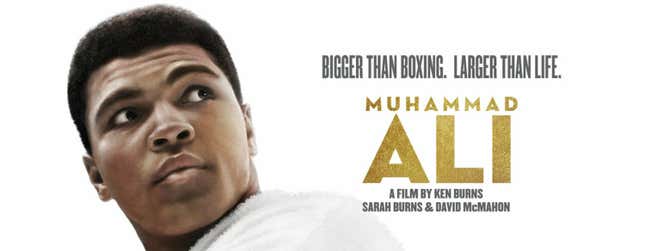
There’s a lot to love about Ken Burns’ latest creation: the gripping PBS documentary, Muhammad Ali.
Taking cues from Burns’ award-winning forays into Black triumph that proceeded this one—such as 2005's Unforgivable Blackness: The Rise and Fall of Jack Johnson and 2016's Jackie Robinson—Muhammad Ali offers a refreshing take on the titular character’s well-documented journey of faith and repositions arguably the greatest athlete of all-time as not only a generational talent, but an integral component of American history.
Throughout the course of this four-part odyssey, there are plenty of moments that most of us are acutely aware of thanks to a seemingly endless succession of films that have mined Ali’s plight for Hollywood gold. But where Muhammad Ali departs from predecessors like Regina King’s One Night In Miami, Will Smith’s Ali, or Antoine Fuqua’s What’s My Name: Muhammad Ali is its access to archival footage that other filmmakers can only dream of obtaining and its commitment to sheer scope. Instead of attempting to shovel 74 years of courage and contradictions into a single sitting, his legacy is given ample room to breathe and is explored over the course of nearly eight hours of riveting cinema.
“Our desire was very mindful of the fact there are many, many wonderful documentaries about Muhammad Ali,” Burns told The Root. “But none of them—we felt—were comprehensive in the kind of work that we like to do.”
In the first chapter, “Round One: The Greatest,” we’re introduced to Cassius Clay, the brash demeanor that would define him, and the amateur boxing circuit that bred a cultural icon. In subsequent chapters, we bear witness to his conversion to Islam, his eventual standoff with the U.S. Army, and his continued quest to use his platform to be in service to Black progress. Much like Martin Luther King Jr., that pledge has since been contorted by those who seek to revise history and dilute his ambitions to suit their own personal agendas, but Muhammad Ali captures the three-time heavyweight champion in all of his unapologetic glory.
And yes, while much of it feels like riding a bike for the first time in over a decade, there are still plenty of little-known trivia answers that the film introduces to the world. Case in point, during Ali’s amateur career he was so scared of flying that he wore a military parachute during his flight to the Olympic trials. And after winning the competition, instead of flying back home to Louisville, Ky., he pawned off one of his prizes—a watch—in order to purchase a train ticket so that he could get back home. Other revelations include Zaire’s (now the Democratic Republic of Congo) dictator Mobutu Sese confiscating George Foreman’s passport in order to ensure that “The Rumble in the Jungle” went on without a hitch, Ali’s affinity for performing magic tricks for former Cuban leader Fidel Castro, and the boxing legend receiving a decapitated dog in the mail—with a letter that read: “We know how to handle black draft-dodging dogs in Georgia”—in order to deter him from returning to the ring in 1970.
Whether you’re brand new, vaguely familiar, or acutely aware of Ali’s story, the comprehensive nature of this film ensures that there’s plenty of magic and meat on the bone for every appetite—insatiable or otherwise. For fans of the sweet science, there’s a treasure trove of fight footage and a meticulous breakdown (it even gets its own chapter) of his bitter rivalry with his archnemesis, “Smokin’” Joe Frazier. For those curious about how his family and religion informed his purpose and unwavering principles, that’s in this documentary, too. And for those curious to learn how the Arthur Ashe Award for Courage winner navigated his final years while at the mercy of Parkinson’s Disease, this film unveils those challenges as well.
In closing, Muhammad Ali truly floats like a butterfly and stings like a bee. It also serves as a timely reminder that even though Ali has long since left this physical plane, his strength and sacrifice will endure forever.
Muhammad Ali airs from Sept. 19-22 exclusively on PBS.

